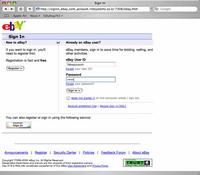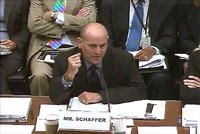-
Attackers have advantage in cyberspace, says cybersecurity expert

Homeland Security NewsWire’s executive editor Eugene Chow recently caught up with Bruce Schneier, a cybersecurity expert and the author of several bestselling books, including “Applied Cryptography,” “Secrets and Lies,” and “Beyond Fear”; in the interview Schneier discusses the recent politically motivated cyberattacks by Anonymous and AntiSec, securing U.S. networks against counterfeit computer chips, and President Obama’s proposed cybersecurity plan
-
-
Anonymous hacker collective hits rural law enforcement

In its latest exploit, global hacker collective Anonymous claimed to release ten GB of stolen data from more than seventy rural sheriff’s departments across the United States, leaking sensitive information that could compromise the agencies’ investigations
-
-
Cost of cyberattacks on the rise
A new study shows that cybercrime is costing corporations 56 percent more than last year; the study conducted by the Ponemon Institute and sponsored by ArcSight, an HP company, found that the median cost of cybercrimes for the fifty companies surveyed was $5.9 million; the increase in costs were largely due to hackers using stealthier techniques
-
-
Microsoft offers $250,000 in cybersecurity competition
Last Wednesday at the annual Black Hat and Defcon convention for hackers, Microsoft announced a competition for cyber security specialists in which it would award $200,000 to the individual who develops the most innovative computer protection technology
-
-
DHS officials: Stuxnet can morph into new threat
Government cybersecurity experts warn that the Stuxnet virus, which damaged Iran’s nuclear centrifuges, could morph into something even more destructive; DHS officials worry that hackers could design more complex versions of the virus that can evade detection and bypass existing software fixes
-
-
New drone listens in on cell phone calls and hacks Wi-Fi networks

At this week’s annual Defcon security conference for hackers, two hobbyists will showcase their sophisticated unmanned Wi-Fi detecting, cell-phone eavesdropping spy drone; the drone was assembled using an old Army target drone that had been converted to run on electric batteries and is now equipped with an HD camera, eleven antennas, and a cigarette pack sized computer that is loaded with hacking tools
-
-
Detecting fake Web sites

A team of researchers develop a new — and more reliable — way to detect fake Web sites; the team developed five categories with thousands of cues, finding that the best results were attained when utilizing thousands of highly visible and also deeply embedded cues, such as placement, URL length, the number of links, characters types on the site and how thorough the site’s “frequently asked questions” section is detailed, among other features
-
-
DHS warns utilities at risk from insider threats
Last week DHS warned critical infrastructure operators like chemical facilities, nuclear power plants, and electric utility companies that terrorists could be targeting major facilities from the inside; officials cautioned that “violent extremists have, in fact, obtained insider positions,” and that “outsiders have attempted to solicit utility-sector employees” for damaging physical and cyber attacks.
-
-
After FBI arrests LulzSec announces more cyber mayhem
In response to the FBI’s arrest of several hackers, the recently disbanded hacking group known as LulzSec has vowed to return and the group says it will renew its attacks on corporations and government agencies; the announcement comes after U.S. authorities arrested sixteen people last week in relation to the groups’ previous attacks which included bringing down PayPal’s website after it suspended its service to WikiLeaks
-
-
Recent deluge of cyber attacks results in record spending
The deluge of high profile cyber attacks on major corporations and government entities like the U.S. Senate, the CIA, and Sony has driven a sharp increase in demand for cyber security experts; in the first six months of this year alone, cyber attacks and data breaches have cost U.S. companies approximately $96 billion, nearly the total for 2010; analysts project 2011 to be the busiest year yet with an estimated $75.6 billion in cyber security spending, surpassing last year’s record $63 billion
-
-
Combating counterfeit microchips // by Dr. James Hayward, Ph.D, Sc.D.
Dr. James Hayward, the chairman, president, and CEO of Applied DNA Sciences, argues that the U.S. government needs to do more to prevent corrupted microchips from entering U.S. computers that make it easier for hackers and foreign governments to infiltrate networks
-
-
Malware imported into U.S. on foreign-made components

A high level DHS official acknowledged that malware built into imported electronic components sold in the United States poses a serious threat to U.S. economy and security; he also said it was a complex threat which the federal government has been trying to address in different ways; Greg Schaffer, acting deputy undersecretary for the National Protection and Programs Directorate at DHS, said the threat is “one of the most complicated and difficult challenges we have”
-
-
AntiSec hacks IRC Federal, posts passwords online
Last Friday, AntiSec, a prominent hacking group, announced that it had successfully infiltrated the servers of IRC Federal; the company has contracts with several major government agencies including the Department of Justice, the Army, Navy, and NASA; in an announcement on their website, AntiSec wrote, “We laid nuclear waste to their systems, owning their pathetic Windows box, dropping their databases and private emails, and defaced their professional looking website”
-
-
Critical vulnerability found in Apple iPhones and iPads
Apple is scrambling to develop a fix for a software vulnerability that leaves its iPhone, iPad, and iPod Touch devices susceptible to hackers; according to Germany’s Federal Office for Information Security, which discovered the critical software vulnerability, hackers can steal confidential data from the devices without the user even suspecting it by exploiting a flaw in the program that allows users to “jail-break” their devices and run non-Apple software
-
-
Foreign made chips could be allowing hackers into U.S. networks
Foreign-made computer parts could be manufactured with flaws or viruses that make it easier for hackers to later infiltrate U.S. computer networks; last week before the House Oversight and Government Reform Committee, Greg Schaffer, DHS’s acting deputy undersecretary national protection and programs director, admitted that some foreign chips are being made with security vulnerabilities
-
- All
- Regional
- Water
- Biometrics
- Borders/Immig
- Business
- Cybersecurity
- Detection
- Disasters
- Government
- Infrastructure
- International
- Public health
- Public Safety
- Communication interoperabillity
- Emergency services
- Emergency medical services
- Fire
- First response
- IEDs
- Law Enforcement
- Law Enforcement Technology
- Military technology
- Nonlethal weapons
- Nuclear weapons
- Personal protection equipment
- Police
- Notification /alert systems
- Situational awareness
- Weapons systems
- Sci-Tech
- Sector Reports
- Surveillance
- Transportation
Advertising & Marketing: advertise@newswirepubs.com
Editorial: editor@newswirepubs.com
General: info@newswirepubs.com
2010-2011 © News Wire Publications, LLC News Wire Publications, LLC
220 Old Country Road | Suite 200 | Mineola | New York | 11501
Permissions and Policies
Editorial: editor@newswirepubs.com
General: info@newswirepubs.com
2010-2011 © News Wire Publications, LLC News Wire Publications, LLC
220 Old Country Road | Suite 200 | Mineola | New York | 11501
Permissions and Policies
